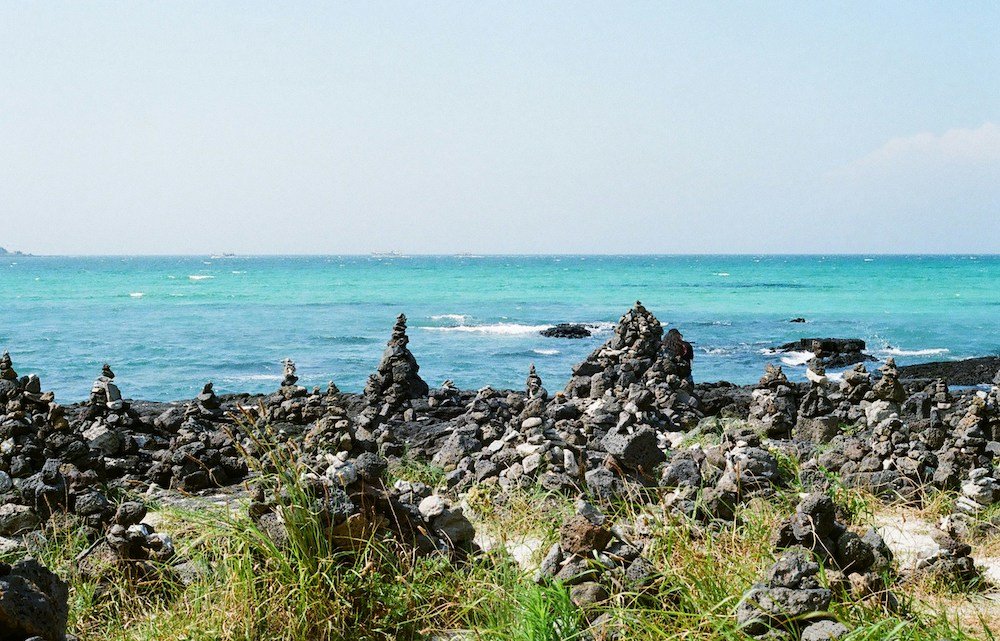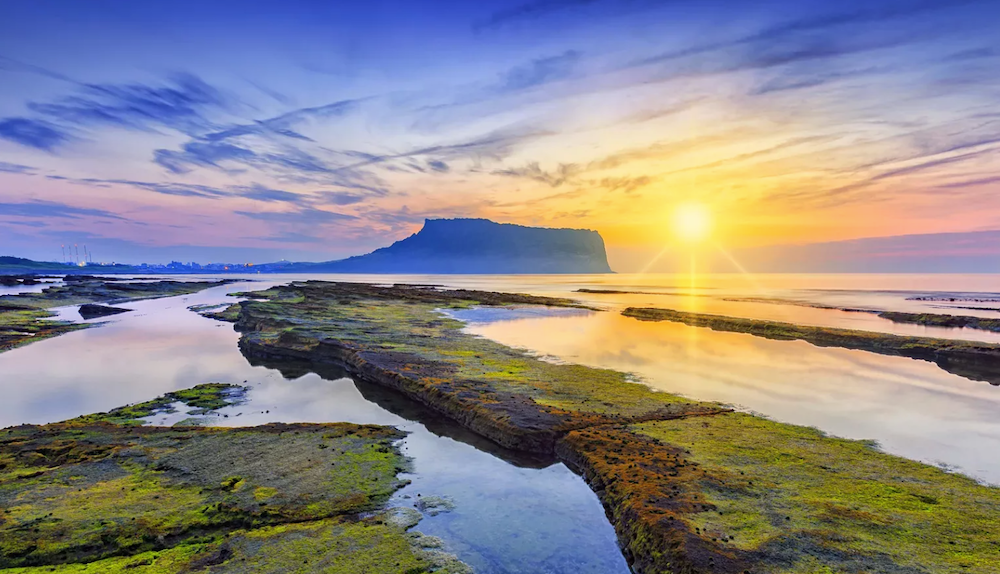
Want to discover when is the best time to visit Jeju Island in South Korea?
Nestled off the southern coast of South Korea, Jeju Island emerges as a gem in the vast expanse of the Pacific Ocean.
Known for its volcanic landscape, lush greenery, and pristine beaches, Jeju Island offers a sanctuary for nature lovers and adventure seekers alike.
This island, the largest in South Korea, is not just a natural wonder but also a place steeped in rich cultural heritage, making it a unique blend of beauty, tradition, and modernity.
Its significance goes beyond just geographical; Jeju Island is a testament to the harmonious coexistence of people and nature, attracting millions of visitors from around the globe each year.
Jeju Island’s popularity as a travel destination is not unfounded.
From the majestic Hallasan Mountain, a dormant volcano at its heart, to the serene beauty of its sandy beaches and the mystical allure of its lava tubes, the island promises an array of experiences.
Add to this the temperate climate, which provides a welcoming atmosphere year-round, and it’s clear why Jeju holds a special place in the hearts of travelers.
However, like any travel destination, the experience of visiting Jeju Island can vary greatly depending on the time of year.
Factors such as weather, tourist crowds, and local events play a significant role in shaping your visit.
Therefore, understanding the best time to visit Jeju Island is crucial for planning a trip that aligns with your travel preferences, whether you’re seeking adventure, relaxation, or cultural immersion.
In this article, we aim to guide you through the intricacies of Jeju Island’s seasonal offerings, helping you pinpoint the best time to visit Jeju Island.
By considering the island’s climate, seasonal activities, and cultural events, we’ll provide you with all the information needed to make an informed decision on when to embark on your Jeju adventure.
Join us as we explore the allure of Jeju through the seasons, ensuring your trip is nothing short of spectacular.
Overview of Jeju Island’s Climate
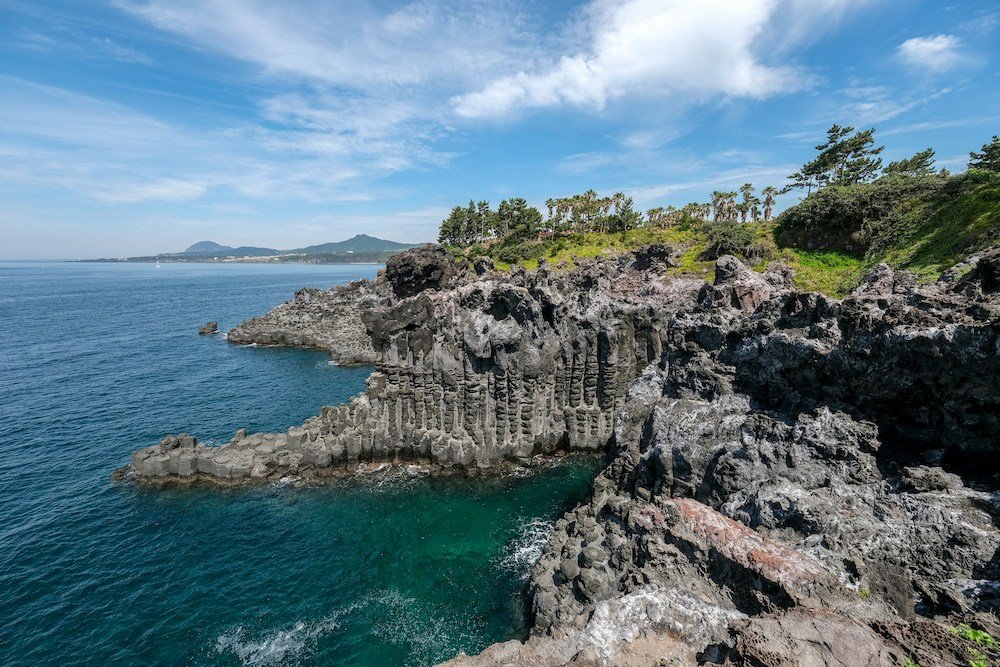
Jeju Island, with its unique geographical location and topography, boasts a mild subtropical climate that sets it apart from the rest of South Korea.
The island experiences four distinct seasons, each bringing its own set of characteristics and beauty.
This climate plays a pivotal role in shaping the island’s natural environment and, by extension, the activities and experiences available to visitors.
Subtropical Climate and Seasonal Changes
The subtropical climate of Jeju Island ensures relatively warm temperatures year-round, making it an attractive destination for those seeking escape from colder climates.
Winters are mild and short, while summers are warm but not excessively hot, thanks to the moderating effects of the surrounding ocean.
Spring and autumn are particularly pleasant, offering an ideal balance of sunny days and cool breezes.
- Spring (March to May) is a time of renewal, with cherry blossoms and a plethora of other flowers blooming across the island, painting the landscape in vibrant colors.
- Summer (June to August) brings warmer temperatures and an increase in rainfall, marking the monsoon season. Despite the occasional showers, the beauty of Jeju’s beaches and waterfalls can be fully appreciated during this lush, green season.
- Autumn (September to November) is characterized by cooler temperatures and less rainfall, making it a perfect time for outdoor activities and exploring the island’s natural wonders without the summer crowds.
- Winter (December to February) is mild compared to mainland Korea, with occasional snowfall that adds a magical touch to the island’s volcanic landscapes and Hallasan Mountain.
Impact on Tourism and Activities
The climate of Jeju Island significantly influences the types of activities available and the overall tourist experience.
For instance, the mild winters allow for year-round hiking, including ascents of Hallasan Mountain, South Korea’s highest peak.
Meanwhile, the vibrant spring season is ideal for flower festivals and outdoor explorations, attracting nature enthusiasts and photographers.
Summer, despite being the wettest season, is a popular time for beachgoers and water sports aficionados. T
he warm ocean waters and lush landscapes provide a perfect backdrop for adventure and relaxation.
However, visitors during this season should be prepared for sporadic rain showers and plan accordingly.
Autumn’s cooler weather and reduced rainfall make it an excellent time for long hikes, cultural festivals, and enjoying the island’s outdoor attractions without the intensity of the summer heat or the crowds.
This season is often recommended as the best time to visit Jeju Island for those looking to experience its natural beauty in a more serene setting.
Understanding Jeju Island’s climate and how it varies throughout the year is crucial for planning your visit.
Whether you’re drawn to the island for its outdoor adventures, cultural experiences, or simply to bask in its natural beauty, knowing the best time to visit Jeju Island based on your personal preferences and the activities you wish to enjoy will ensure a more fulfilling and enjoyable trip.
Seasonal Breakdown
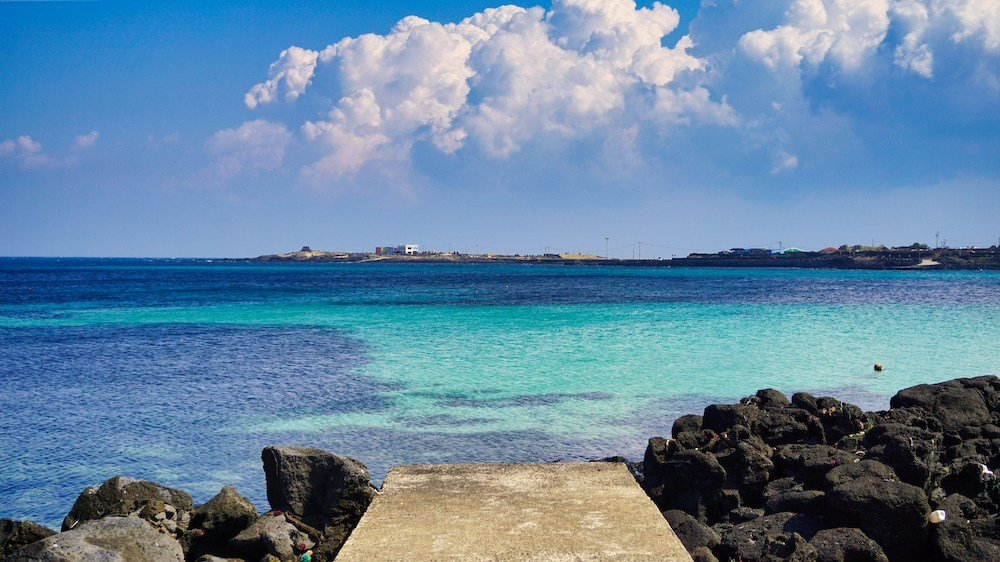
Jeju Island’s distinct seasons each offer unique experiences, catering to a wide range of interests and preferences.
Here’s what you can expect in terms of weather, activities, and tourist dynamics throughout the year.
Spring (March to May)
Weather Conditions: Spring on Jeju Island is a spectacle of mild temperatures and blooming nature. The island comes alive with cherry blossoms and a myriad of other spring flowers, creating a picturesque landscape that’s hard to resist.
Recommended Activities: This season is perfect for attending vibrant flower festivals, such as the Jeju Cherry Blossom Festival. Outdoor enthusiasts will enjoy hiking trails, including the scenic paths of Hallasan Mountain, and the weather is also ideal for exploring Jeju’s numerous theme parks, like Eco Land or the Jeju Loveland.
Crowds and Prices: Spring attracts a moderate number of tourists, especially during the cherry blossom peak. Prices for accommodations can be higher during festival periods, but overall, this season offers a good balance between pleasant weather and manageable tourist numbers.
Summer (June to August)
Weather Conditions: Summer brings warm temperatures and high humidity, alongside the monsoon season known as Jangma. Despite the rain, the island’s lush landscapes and vibrant greenery are at their peak.
Recommended Activities: The warm ocean waters make this the best time for beach visits, water sports, and exploring the island’s famous waterfalls, such as Cheonjiyeon and Jeongbang. The Jeju Fire Festival, held in early summer, is another attraction not to be missed.
Crowds and Prices: Summer marks the peak tourist season on Jeju Island, with domestic and international visitors flocking to its shores. Consequently, prices for flights and accommodations are at their highest, and popular sites can be crowded.
Autumn (September to November)
Weather Conditions: Autumn ushers in cooler temperatures and a dramatic display of foliage across the island’s landscapes, making it an ideal time for nature lovers.
Recommended Activities: The season is perfect for hiking, especially along the Jeju Olle Trail, which offers breathtaking views of the autumn colors. Cultural festivals abound, providing a glimpse into the island’s rich heritage.
Crowds and Prices: Tourist numbers dwindle, leading to more favorable pricing for accommodations and services. The weather is conducive to outdoor activities without the discomfort of summer’s heat or the crowds, making autumn an excellent choice for those seeking a more tranquil Jeju experience.
Winter (December to February)
Weather Conditions: Winter on Jeju Island is relatively mild, with occasional snowfall that adds a unique charm, especially to the volcanic landscapes and Hallasan Mountain.
Recommended Activities: It’s a great time for winter sports in the mountainous regions, relaxing in hot springs, and enjoying indoor attractions without the rush of peak seasons. The Seogwipo Citrus Festival showcases Jeju’s famed tangerines and offers a taste of local culture.
Crowds and Prices: This season sees the fewest tourists, resulting in lower prices for flights and accommodations. It’s an ideal time for budget travelers or those wishing to avoid crowds, with the added bonus of experiencing Jeju’s winter beauty.
Best Time for Specific Interests
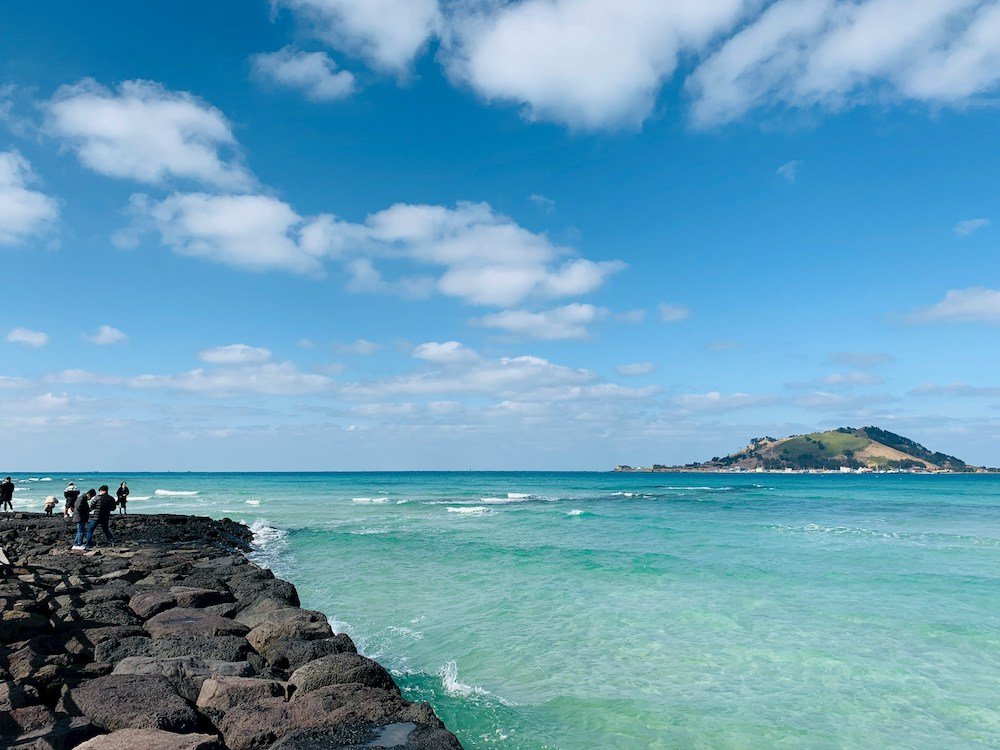
Jeju Island offers a diverse range of activities and experiences, catering to various interests.
Whether you’re an outdoor enthusiast, a culture buff, or someone looking to unwind, the timing of your visit can significantly enhance your experience. Here’s when to visit based on your interests:
Outdoor Activities and Adventure
For those drawn to the great outdoors and seeking adventure, spring (March to May) and autumn (September to November) are the best times to visit.
The mild weather during these seasons is ideal for hiking, enabling you to fully appreciate Jeju Island’s natural beauty without the extreme heat or cold.
Spring brings the added bonus of blooming flowers, while autumn offers the spectacle of vibrant foliage.
Water sports enthusiasts will find summer (June to August) to their liking, as the warmer sea temperatures are perfect for swimming, diving, and other water-based activities.
Cultural Experiences
If immersing yourself in local culture and attending festivals is your priority, spring and autumn are again the seasons to target.
These periods are rich with cultural events, from the Jeju Fire Festival in early spring to the Jeju Chuseok Festival in autumn.
Museums and indoor exhibitions can be enjoyed year-round, but visiting during these seasons combines the comfort of mild weather with the opportunity to engage in outdoor cultural activities and festivals.
Relaxation and Leisure
For those looking to relax and enjoy Jeju’s resorts or prefer a quieter, more leisurely experience, late autumn (late October to November) and winter (December to February) are ideal.
These times offer the dual advantages of fewer tourists and lower prices, making it easier to enjoy Jeju’s scenic beauty in peace.
Winter, in particular, provides a unique opportunity to enjoy the island’s hot springs, offering relaxation amidst cooler temperatures and the serene winter landscape.
Special Considerations
- Summer is perfect for beach lovers but be prepared for higher tourist numbers and prices.
- Winter offers the unique charm of Jeju’s snowscapes, especially around Hallasan Mountain, and is the best time for those seeking solitude and the beauty of a quieter Jeju.
Best Things to Do in Jeju Island
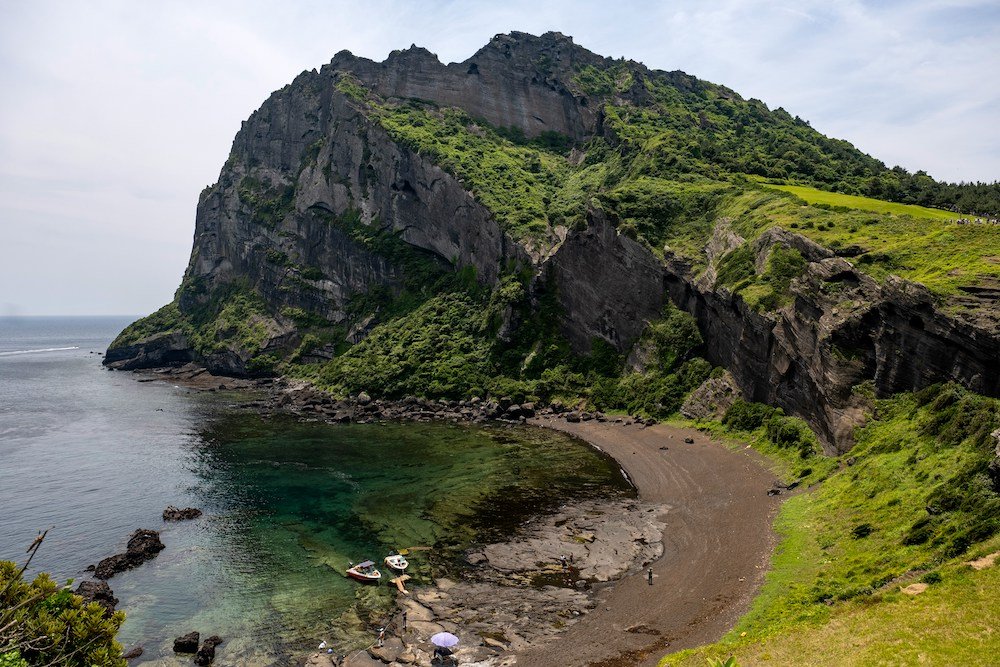
Jeju Island, a treasure trove of natural beauty and cultural richness, offers a plethora of activities and attractions for every type of traveler.
Whether you’re an adventure seeker, a culture enthusiast, or simply in need of a peaceful retreat, Jeju has something special for you.
Here’s a curated list of must-see and must-do experiences to ensure you make the most of your visit to this unique destination.
Explore Natural Wonders
- Hallasan Mountain: Dominating the island’s landscape, Hallasan is South Korea’s highest peak and a haven for hikers. The mountain offers various trails that cater to all levels of fitness, each leading to the summit for panoramic views of the island and beyond.
- Jeongbang Waterfall: This stunning waterfall is unique as it is one of the few in the world that falls directly into the ocean. The sound of the water, the sea spray, and the scenic backdrop make for an unforgettable experience.
- Manjanggul Cave: Venture into the subterranean world of Manjanggul Cave, one of the longest lava tubes on the planet. The cave is a natural marvel, showcasing the geological beauty that lies beneath Jeju’s surface.
Experience Jeju’s Beaches
- Hyeopjae Beach: Known for its soft white sand and crystal-clear blue waters, Hyeopjae Beach is perfect for swimming, sunbathing, and picnics. The beach is also a great spot to watch the sunset over the ocean.
- Udo Island: Just a short ferry ride from Jeju, Udo Island offers stunning beaches, vibrant marine life, and unique landscapes. It’s an ideal destination for a day trip, with plenty to explore and enjoy.
Discover Cultural Sites
- Seongsan Ilchulbong (Sunrise Peak): This UNESCO World Heritage site is famous for its dramatic crater and is best visited at sunrise for a breathtaking view of the sun rising over the sea.
- Jeju Folk Village: Step back in time at Jeju Folk Village, where you can explore traditional houses, learn about Jeju’s unique culture, and experience the island’s way of life in the past.
Adventure and Leisure Activities
- Jeju Olle Trail: Spanning the island, the Jeju Olle Trail is a network of paths that take you through coastal areas, villages, and fields, offering a unique way to experience Jeju’s diverse landscapes.
- Theme Parks and Museums: For family fun, visit attractions like Loveland, Teddy Bear Museum, or Eco Land Theme Park, each offering a unique experience that blends entertainment with education.
- Diving and Water Sports: The waters around Jeju are teeming with marine life, making it a prime location for scuba diving, snorkeling, and various water sports.
Culinary Experiences
- Local Cuisine: Jeju’s culinary scene is as diverse as its landscape. Don’t miss out on trying local specialties such as black pork BBQ, fresh seafood, and Jeju tangerines, each bursting with flavor.
- Traditional Markets: For an authentic taste of Jeju, visit markets like Dongmun Market. Here, you can sample local delicacies, shop for souvenirs, and immerse yourself in the bustling atmosphere.
Wellness and Relaxation
- Spa and Wellness: Indulge in a rejuvenating experience at a traditional Korean spa (jjimjilbang) or one of the many wellness resorts on the island, offering treatments that blend modern techniques with traditional healing practices.
- Beachside Relaxation: With its numerous pristine beaches, Jeju is the perfect place to unwind. Spend your days lounging by the sea, soaking up the sun, and enjoying the tranquil beauty of the island.
Tips for Visiting Jeju Island
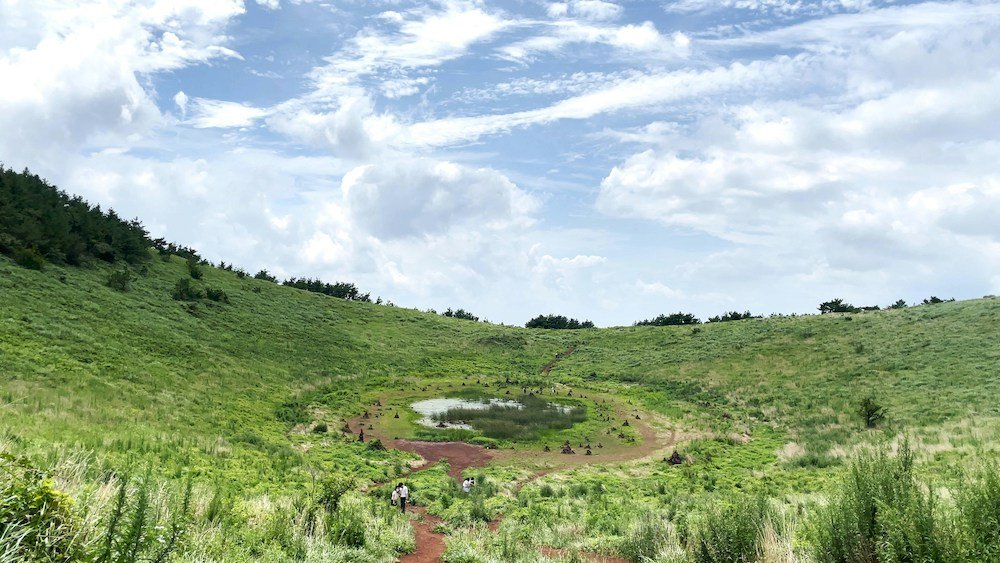
A trip to Jeju Island is a journey into a world of natural beauty, rich culture, and unforgettable experiences.
To make the most of your visit, consider these practical tips on accommodation, transportation, and respecting local customs and etiquette.
Accommodation
Booking Strategies: Plan and book your accommodation in advance, especially if you’re visiting during peak seasons (summer and spring).
Jeju offers a range of options from luxury resorts to budget guesthouses and Airbnb rentals.
For the best rates and choices, consider booking several months ahead of your trip.
Recommended Areas:
- Jeju City: Ideal for first-time visitors, offering easy access to the airport, local attractions, and shopping.
- Seogwipo: Perfect for those seeking a more scenic and tranquil setting, closer to natural attractions on the southern side of the island.
- Jungmun: A great choice for luxury travelers, known for its resorts, beaches, and proximity to the Jeju International Convention Center.
Transportation
Getting to Jeju: Jeju International Airport serves as the main gateway to the island, with frequent flights from major cities in South Korea and select international destinations.
Ferries are another option, though less common, available from mainland ports like Busan and Incheon.
Getting Around Jeju:
- Rental Cars: Renting a car is the most convenient way to explore Jeju, offering flexibility to visit off-the-beaten-path locations. International visitors will need an International Driving Permit (IDP).
- Public Transportation: Jeju’s bus system connects major attractions, cities, and towns, making it a viable option for those without a car. English route information is available, but planning ahead is recommended.
- Taxis and Ride-Sharing: Taxis are readily available and relatively affordable. Ride-sharing apps also operate on the island, providing an alternative for short distances.
Local Customs and Etiquette
Respecting Nature: Jeju’s natural landscapes are precious. Always stay on marked trails when hiking, avoid littering, and respect wildlife habitats.
Cultural Respect: When visiting cultural sites and temples, dress modestly and follow any posted guidelines. It’s also polite to remove your shoes before entering traditional homes or certain indoor spaces.
Interacting with Locals: Jeju’s residents are known for their hospitality. A friendly greeting in Korean (“Annyeonghaseyo”) goes a long way. Be mindful of local customs, and always ask permission before taking photos of people.
Environmental Practices: Participate in eco-friendly practices by reducing waste, using public transport or eco-friendly vehicles, and supporting local businesses that prioritize sustainability.
By following these tips, you’ll not only ensure a smoother trip but also contribute positively to the preservation of Jeju Island’s unique environment and culture.
Enjoy your journey to this incredible South Korean island, where every visitor has the opportunity to create lasting memories.
Conclusion
Jeju Island, with its stunning natural landscapes, rich cultural heritage, and diverse activities, offers a unique destination for travelers from around the world.
Throughout this guide, we’ve explored the best times to visit Jeju Island, catering to a wide range of interests and preferences.
Whether you’re drawn to the outdoor adventures awaiting on the trails of Hallasan Mountain, the cultural festivities that bring the island’s traditions to life, or the serene beauty of Jeju’s beaches and natural wonders, timing your visit can significantly enhance your experience.
Spring (March to May) emerges as a vibrant time for flower enthusiasts and hikers.
Summer (June to August), with its warm weather and lush landscapes, is perfect for beach lovers and water sports aficionados.
Autumn (September to November) offers a picturesque backdrop for outdoor activities and cultural exploration without the crowds.
Meanwhile, winter (December to February) provides a quieter, more reflective time to enjoy Jeju’s scenic beauty and unique winter activities.
As you plan your trip to Jeju Island, remember the importance of booking accommodations and transportation in advance, especially during peak seasons.
Embrace the local culture and customs with respect, and take steps to protect the beautiful environment that makes Jeju so special.
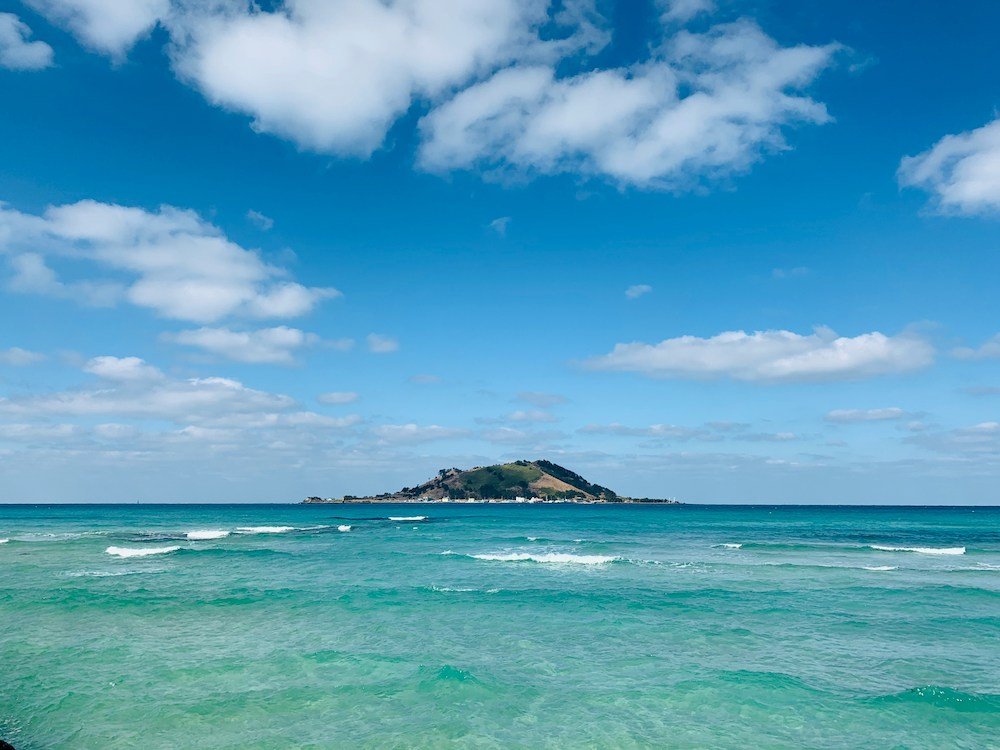
FAQ’s About Jeju Island:
Why is Jeju Island so famous?
Jeju Island is renowned for its stunning natural landscapes, unique volcanic features, and beautiful beaches.
It’s South Korea’s largest island and offers a diverse range of attractions, including the UNESCO World Heritage Site Jeju Volcanic Island and Lava Tubes.
These include Hallasan Mountain, the highest peak in South Korea, and the impressive Manjanggul Lava Tube.
The island’s cultural significance, pleasant climate, and the hospitality of its people also contribute to its fame, making it a popular destination for both domestic and international tourists.
Why is Jeju Island one of the 7 Wonders?
Jeju Island was named one of the New7Wonders of Nature in 2011, a testament to its exceptional natural beauty and geological significance.
This recognition is due to its distinctive volcanic landscape, including the majestic Hallasan Mountain, extensive lava tube systems like Manjanggul Cave, and the visually striking tuff cone of Seongsan Ilchulbong (Sunrise Peak).
These natural phenomena, formed by volcanic activity, create a unique ecosystem and offer scientific value, contributing to Jeju’s status as a wonder of nature.
Is it worth going to Jeju Island?
Yes, visiting Jeju Island is worth it for many reasons. The island offers a unique blend of natural beauty, cultural experiences, and recreational activities.
Visitors can explore volcanic craters, lush green tea fields, sandy beaches, and waterfalls.
The island also boasts a rich cultural heritage, with traditional villages, museums, and local cuisine that provide insights into Jeju’s history and way of life.
For those interested in outdoor activities, there’s hiking, diving, and exploring the extensive network of walking trails.
Overall, Jeju Island presents a comprehensive travel experience that caters to a wide range of interests.
How do I get from Seoul to Jeju?
The most common and efficient way to get from Seoul to Jeju is by air.
Multiple airlines operate frequent flights between Seoul’s Gimpo Airport (GMP) and Jeju International Airport (CJU), with the journey taking about an hour.
This is the preferred method for most travelers due to the speed and convenience.
Alternatively, for those who prefer sea travel, you can take a ferry from various mainland ports to Jeju, but this option requires more time and planning.
How long is the ferry ride from Seoul to Jeju Island?
There is no direct ferry service from Seoul to Jeju Island.
Travelers looking to take a ferry to Jeju typically need to travel to coastal cities such as Incheon, Mokpo, or Busan, where they can catch a ferry to the island.
Depending on the departure port and ferry type, the journey can range from approximately 3 hours (from Busan using a fast ferry) to 12 hours or more (from Incheon or Mokpo using a conventional ferry).
How long is it by ferry from Korea to Jeju?
The ferry duration from mainland Korea to Jeju varies depending on the departure city:
- From Mokpo, the journey takes about 4.5 to 5 hours by conventional ferry.
- From Busan, fast ferries can make the trip in about 3 hours, while conventional ferries take longer.
- From Incheon, the journey is the longest, typically taking around 12 to 13 hours by conventional ferry.
How many days in Jeju is enough?
Most travelers find that 3 to 5 days in Jeju allow for a satisfying exploration of the island’s main attractions, including natural wonders, beaches, and cultural sites.
However, if you’re interested in a more relaxed pace or want to delve deeper into Jeju’s offerings, extending your stay to a week or more can provide a more comprehensive experience, allowing time for leisurely exploration and unexpected discoveries.
Is Jeju Island English friendly?
Jeju Island is relatively English-friendly, especially in tourist areas, major hotels, and attractions.
English signage is common at tourist sites, and maps and information brochures are often available in English.
However, in smaller restaurants and remote areas, English may be less commonly spoken, and menus might not be available in English.
Learning a few basic Korean phrases can enhance your experience, but overall, travelers should find navigating Jeju Island in English manageable.
Do people in Jeju speak English?
While Korean is the primary language spoken in Jeju, a reasonable number of people, particularly those working in the tourism industry, can speak English to some extent.
This includes staff at major hotels, attractions, and some restaurants.
However, the level of English proficiency can vary, and in rural areas or less touristy spots, English speakers may be less common.
It’s always helpful to know some basic Korean phrases for everyday interactions.
Is Busan or Jeju Better?
Choosing between Busan and Jeju depends on your travel preferences.
Busan, Korea’s second-largest city, offers a vibrant urban experience with its bustling ports, beaches, markets, and cultural festivals.
It’s a city that combines modernity with traditional Korean culture, renowned for its seafood, dynamic nightlife, and the famous Haeundae Beach.
Jeju Island, on the other hand, provides a more nature-centric getaway. It’s ideal for travelers seeking outdoor adventures, natural beauty, and a slower pace of life.
Jeju is famous for its volcanic landscapes, tranquil beaches, and unique cultural heritage sites.
It offers a diverse range of activities, from hiking on Hallasan Mountain to exploring lava tubes and waterfalls.
If you’re looking for an urban adventure with the convenience of city life and access to cultural experiences, Busan might be the better choice.
However, if you prefer a more relaxed atmosphere with a focus on natural wonders and outdoor activities, Jeju Island would be more suitable.
Both destinations have their unique charms and attractions, making them worth visiting based on what you want to experience.
Is Jeju Island like Hawaii?
Jeju Island is often compared to Hawaii due to its volcanic origins, lush landscapes, beautiful beaches, and mild climate.
Both islands are renowned for their natural beauty, offering a range of outdoor activities like hiking, swimming, and exploring unique geological formations.
However, while there are similarities in their natural environments, Jeju and Hawaii have distinct cultural backgrounds, cuisines, and traditions, giving each island its unique charm and appeal.
Jeju Island embodies a unique blend of Korean culture and its own local customs, providing a different experience from the more Western-influenced Hawaiian Islands.
